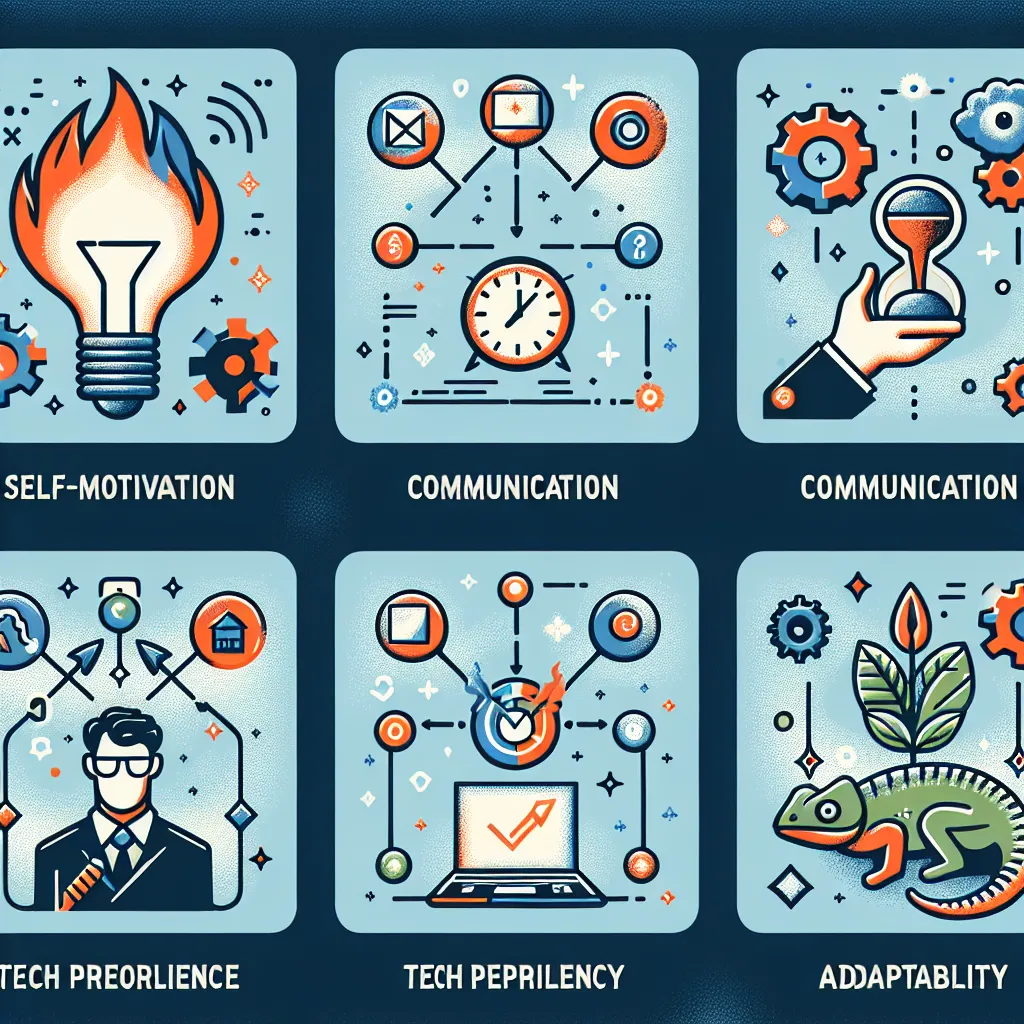Remote work has become increasingly prevalent in today’s professional landscape, and being able to effectively communicate your experience in this area during a job interview is crucial. Whether you’re a seasoned remote worker or have recently adapted to this work style, articulating your skills and experiences can set you apart from other candidates. This guide will help you navigate the process of explaining your remote work experience in English, ensuring you make a strong impression during your interview.
Understanding the Importance of Remote Work Experience
In recent years, remote work has transformed from a rare perk to a standard option in many industries. Employers are increasingly interested in candidates who can demonstrate their ability to work effectively outside of a traditional office setting.
Key Skills Valued in Remote Workers
When explaining your remote work experience, it’s essential to highlight the following skills:
- Self-motivation and discipline
- Strong communication abilities
- Time management and organization
- Technological proficiency
- Adaptability and problem-solving
 Key Skills for Remote Work
Key Skills for Remote Work
Crafting Your Remote Work Narrative
When discussing your remote work experience, it’s important to provide a clear and compelling narrative that showcases your abilities and achievements.
Structuring Your Response
- Begin with a brief overview of your remote work history.
- Highlight specific projects or responsibilities you managed remotely.
- Discuss challenges you faced and how you overcame them.
- Emphasize the skills you developed or enhanced through remote work.
- Conclude with how your remote work experience makes you a strong candidate for the position.
Sample Responses to Common Interview Questions
Let’s explore some common questions about remote work experience and how to answer them effectively.
“Can you describe your experience with remote work?”
Sample answer: “I’ve been working remotely for the past three years as a software developer. During this time, I’ve successfully completed several major projects, including developing a customer relationship management system for a multinational corporation. Working remotely has honed my ability to manage my time effectively, communicate clearly with team members across different time zones, and stay productive in a home office environment. I’ve also become proficient in using various collaboration tools such as Slack, Trello, and Zoom to maintain seamless communication with my team.”
“How do you stay motivated when working remotely?”
Sample answer: “To stay motivated while working remotely, I’ve developed a structured daily routine. I start each day by reviewing my tasks and setting clear goals. I use the Pomodoro technique to maintain focus and take regular breaks to stay refreshed. I also make it a point to have virtual coffee chats with colleagues to maintain social connections and discuss work-related matters informally. Additionally, I’ve created a dedicated workspace at home that helps me mentally transition into ‘work mode’ and minimize distractions.”
“How do you handle communication challenges in a remote setting?”
Sample answer: “Effective communication is crucial in remote work. I prioritize clear and concise written communication, ensuring my emails and messages are easily understood. I’m proactive in scheduling regular video calls with team members to discuss complex issues and maintain personal connections. I also use project management tools to keep everyone updated on task progress. When misunderstandings occur, I address them promptly through direct communication, often opting for a quick video call to resolve issues efficiently.”
Addressing Potential Concerns
Employers may have concerns about remote work, so it’s important to address these proactively.
“How do you ensure work-life balance when working from home?”
Sample answer: “Maintaining a healthy work-life balance is essential for long-term productivity. I achieve this by setting clear boundaries between work and personal time. I have a designated home office space that I ‘leave’ at the end of each workday. I also use time management tools to track my hours and ensure I’m not overworking. Regular exercise and social activities outside of work hours help me recharge and stay focused during work time.”
“How do you handle technical issues when working remotely?”
Sample answer: “I’ve developed strong troubleshooting skills to handle common technical issues. I keep my equipment well-maintained and have backup internet options, such as a mobile hotspot. For more complex issues, I maintain good relationships with our IT support team and don’t hesitate to reach out when needed. I also stay updated on the latest remote work tools and technologies to prevent potential problems.”
Common Mistakes to Avoid
When discussing your remote work experience, be cautious of these common pitfalls:
- Overemphasizing the challenges of remote work
- Failing to provide specific examples of your achievements
- Neglecting to mention the skills you’ve developed
- Sounding like you prefer remote work to in-office work (unless the position is fully remote)
- Forgetting to highlight your ability to collaborate effectively in a remote setting
Follow-up Questions and How to Answer Them
Be prepared for these potential follow-up questions:
-
“How do you collaborate on projects with team members in different time zones?”
Answer: Discuss your experience with asynchronous communication and how you adjust your schedule when necessary for important meetings. -
“What strategies do you use to maintain team cohesion in a remote environment?”
Answer: Mention virtual team-building activities, regular check-ins, and how you foster a sense of community through digital channels. -
“How do you handle distractions when working from home?”
Answer: Explain your strategies for creating a focused work environment and managing potential interruptions. -
“Can you give an example of a successful remote project you led?”
Answer: Provide a specific example, outlining your role, the challenges faced, and the positive outcomes achieved. -
“How do you ensure data security when working remotely?”
Answer: Discuss your practices for maintaining cybersecurity, such as using VPNs, secure file sharing, and following company protocols.
Conclusion
Effectively communicating your remote work experience in English requires preparation and practice. By highlighting your achievements, addressing potential concerns, and showcasing the valuable skills you’ve developed, you can present yourself as a strong candidate capable of thriving in any work environment. Remember to tailor your responses to the specific job requirements and company culture, and always be ready to provide concrete examples of your remote work successes.
For more tips on acing your job interview, check out our articles on how to talk about your interpersonal skills in an interview and how to discuss your experience in managing teams.




